PIER LUIGI PIZZI
IT COULD WORK
You must have recognized in the title the phrase, which has become very famous, with Gene Wilder, in the movie Young Frankenstein (in Italy, Frankenstein Junior). Well, we must confess that this is exactly what we thought when the curtain rose (virtual curtain, since unfortunately we only watched the opera live on streaming) a few days ago, on Rossini’s Moïse et Pharaon, staged by Pier Luigi Pizzi at the Rossini Opera Festival in Pesaro. Obviously, being Italian, we remembered the line in Italian (Sì – può – fare !!! It can be done!). And, in our opinion, in Italian it is even more effective, since replacing the conditional (could) with the indicative (can) makes it an even stronger statement.
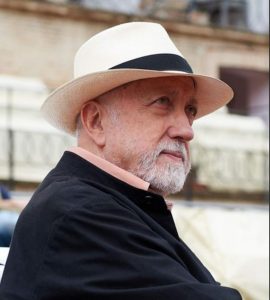
IT CAN BE DONE
It CAN. It is true. We had unmistakable evidence: a director can stage an opera – indeed a masterpiece in the history of opera – giving life to a show that is pleasing to eye, open to modern technology, but, above all, faithful to the history created by the authors. And, at the same time, “new”, original, capable of arousing interest without creating annoying questions about occult “meanings” that the director conceived in his mind and tried to communicate to the audience.
Of course, Pizzi’s staging disappointed the mourners of the late Graham Vick (who was certainly second to none in twisting and turning and upsetting the operas he staged), but this was predictable and obvious. We are more than willing to leave them be in their nostalgia, and hope for a better future.
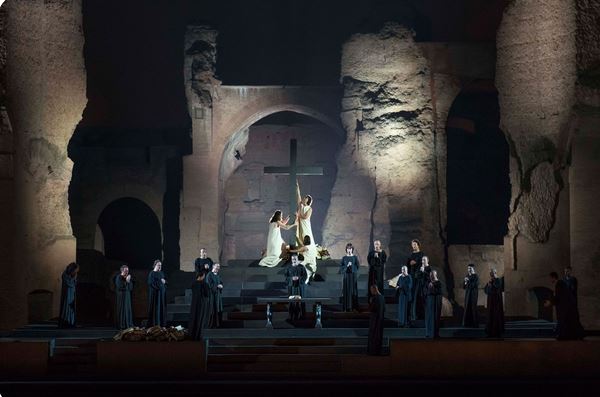
We must confess that we never had the opportunity to know directly the Moïse et Pharaon Graham Vick staged back in 1997. Unfortunately, though, we know and remember all too well the absurd Mosé in Egitto he “invented” in 2011. How could we forget the Kalashnikov Moses held in his arms singing his prayer, the video cameras filming his speeches, the maids with the vacuum cleaner in the king’s palace, the battered Volkswagen van full of terrorists, the crystal chandelier that fell by divine hand onto the son of the pharaoh, and, last but not least, the tank waiting beyond the Red Sea?
Well, we are especially pleased to inform our readers that they will not find anything of this sort in the Moïse et Pharaon staged by the dean of opera directors. The great Pier Luigi Pizzi solves what is, today, the key problem of directing an opera: being “modern”, being pleasant and interesting for the public of the 2000s, while remaining faithful to the original text (and, of course, to the music).
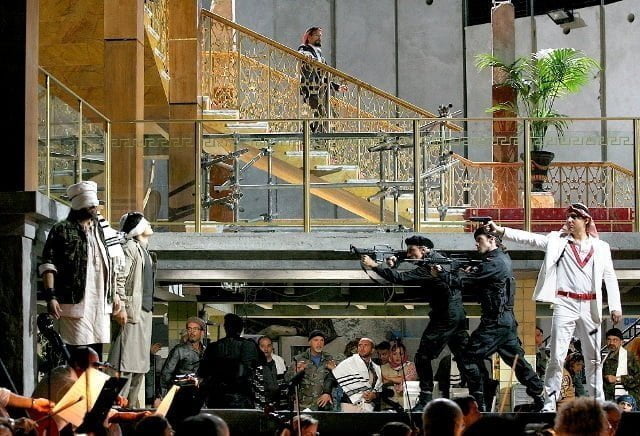
Pizzi revolves everything around his frequently used central idea, in particular in his always beautiful stagings of Baroque operas: to reduce things to their essential. To suggest rather than to show. To leave to the imagination and sensitivity of the viewer the freedom to integrate what is not immediately visible. So, in this Moïse, everything is played in a sparse, geometric scenography with some fixed and very few mobile elements. And above all, in beautiful costumes, differentiated by color between Jews (all in shades ranging from brown, to sand, to ivory) and Egyptians, with predominant colors between blue and purple. Costumes which, like the scene, do not claim to be “calligraphic”, are not photocopied from the paintings of the Egyptian tombs, but have the evocative ability to “suggest” the world of an ancient as well as timeless Egypt.
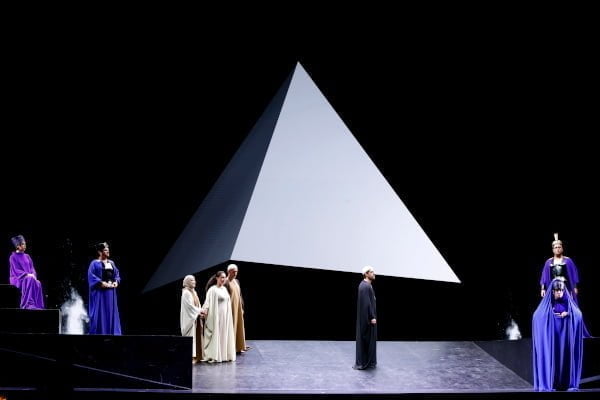
These ample, floating, costumes, “real” without being realistic, with the colors, and with a careful – indeed meticulous – composition of the figures and the gestures of the choir, are all the director needs to draw beautiful and evocative tableaux vivants, with the economy of movements imposed by Rossini’s opera, which is much more an oratorio than a real “melodrama”.
Added to this, there are moments when the story provides opportunities to use modern technology, such as, in particular, the highly effective scene of the rain of fire that falls on the Egyptians.
We are willing to admit that we did not like everything equally. But at times there were minor details in the costumes (for example, the Egyptians’ boots seemed out of place…) and scenes that aroused some perplexity, such as the consecration of the first-borns in a kind of baptismal pool and the consequent ritual dance, which were not particularly successful. However, these moments did not affect our general judgment, and surely did not diminish the pure pleasure we derived from attending this show.
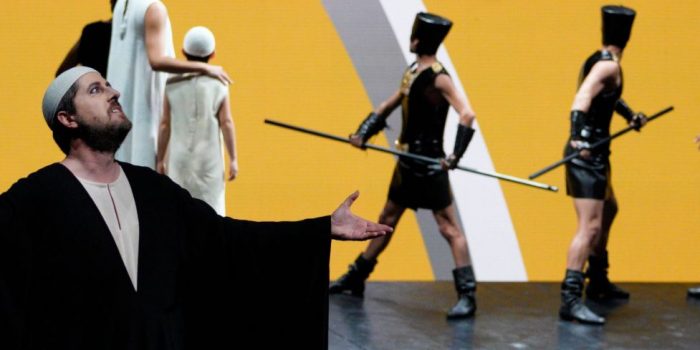
Hence our hopeful title: IT COULD WORK. A director can create a beautiful, new show, appreciated by today’s audience, and at the same time stage an opera recognizable at first sight: an opera which is unmistakably Rossini’s Moïse et Pharaon, to be heard and seen and enjoyed with relaxed pleasure, and from whose musical, historical, religious implications the audience are free to draw their own conclusions.
We can only hope that this example of a great master will inspire those who, in their trade, still resist the lure (and the diktats) of “regietrash”.
Marina Boagno

For Graham Vick‘s in 2011 version the Israeli ambassador in Italy protested against the antisemitim and and anti- isrselism of of this terrible production. Before attacking a reviewer personally, one should definately transform one‘s grey into on Modus.
wow! when I read this review I imagined the reviewer to be approx 85 years old… as it turns out, she is slightly younger, but hey, the article reads like a description of an incredibly boring production by an incredibly boring reviewer… well done, operagazet! hence with it! why not try to get a life, eventually? 🙂
Your response shows a glaring lack of inner civilization. Furthermore, you are guilty of discrimination in a most indecent manner, namely age discrimination. Also, your response demonstrates intellectual inability and lack of respect. You do not have one single valid argument. Maybe it is not too late: why not tru to get an education, eventually?